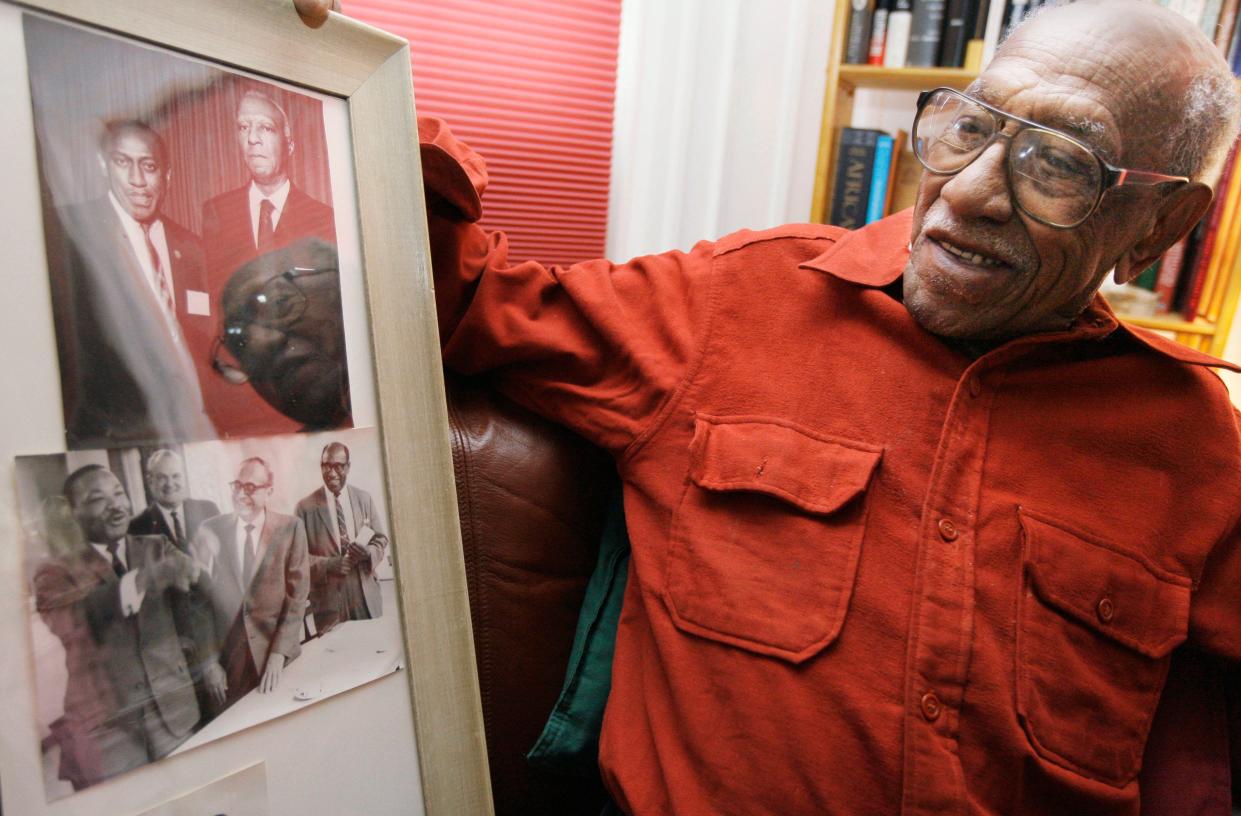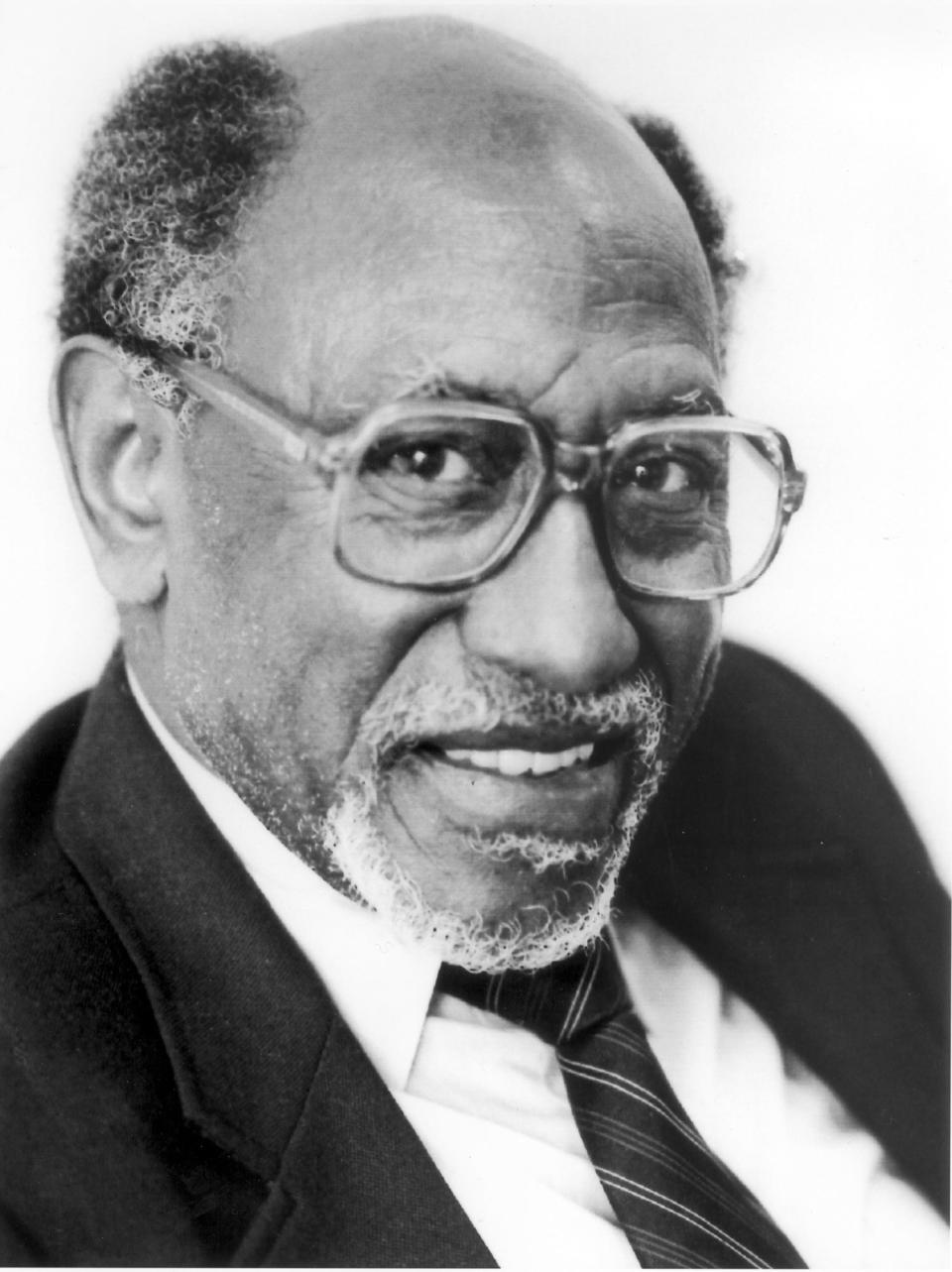Historian and civil rights activist Timuel Black Jr. dies at 102

- Oops!Something went wrong.Please try again later.
- Oops!Something went wrong.Please try again later.
CHICAGO – Labor organizer, educator, author and civil rights activist Timuel Black Jr. died Wednesday. He was 102.
Black entered hospice care in his South Side Chicago home more than two weeks ago, his wife, Zenobia Johnson-Black, told USA TODAY.
"I hope to celebrate his life every day of my life," Johnson-Black said. "He was trying to make this world a better place. And that's what he urged others to do. So that's how I hope he'll be remembered."
Former President Barack Obama said "the world lost an icon" with Black’s passing Wednesday.
"Tim spent decades chronicling and lifting up Black Chicago history. But he also made plenty of history himself," Obama said in a statement. Black attended Barack Obama’s inauguration in 2009.
"Over his 102 years, Tim was many things: a veteran, historian, author, educator, civil rights leader, and humanitarian," Obama said. "But above all, Tim was a testament to the power of place, and how the work we do to improve one community can end up reverberating through other neighborhoods and other cities, eventually changing the world."
The grandson of enslaved people, Black as an infant survived the influenza pandemic of 1918. His family migrated from Alabama to Chicago in 1919, arriving shortly after the deadly "Red Summer" race riots in the city that year.
Black was in elementary school in 1926 when his father took him to a local YMCA to witness historian Carter G. Woodson introduce the first Negro History Week, which evolved over the decades into Black History Month.
"The honor of having been there at the beginning is something I remember," he told USA TODAY.
More: Activists chart course for Black America's progress after a year of turmoil
Black was an Army soldier in World War II, where he faced discrimination in the ranks yet earned four bronze battle stars. He was part of the Normandy invasion and fought in the Battle of the Bulge. He visited the Buchenwald concentration camp in Germany after it was liberated. Those experiences, he said, changed him.
"When bombs were dropping and boys were shooting – I don’t believe world wars are the answer, but I was there – I believed that somehow I was going to come home, and therefore when I saw the destruction that could happen to human beings by other human beings even more deeply, I thought I had a responsibility to bring about change: peace, justice and equality," Black told USA TODAY in February.
When he returned, Black attended Roosevelt University in Chicago and received a degree in sociology in 1952. He received a master's degree from the University of Chicago in 1954 and later taught at the City Colleges of Chicago.
He inserted himself into the fight for equality barely a year later, after seeing a young Martin Luther King Jr. preach on television in December 1955 about the bus boycott in Montgomery, Alabama.
"That was it for me," Black wrote in his 2019 autobiography, "Sacred Ground." "I jumped on a plane and flew down to Montgomery. I was so enthralled that I wanted to be a part of it."
During the late 1950s and early 1960s, Black commuted between Alabama and Chicago to help build a network of support for King's movement.
The men developed a good relationship. King referred to him as "TD" or "Brother Black." And Black called King "Doc."
"I was older, and he treated me as an older brother; his attitude was respectful, and I felt kinship and honor," Black said in his book.
In the early '60s, Black became a fierce labor organizer. He served as the president of the Chicago chapter of the Negro American Labor Council, founded by labor leader A. Philip Randolph.
Black's influence in civil rights became evident when in 1963 when King tapped him to mobilize thousands of Chicagoans to go to the nation's capital via charter buses and entire railroad trains for the March on Washington for Jobs and Freedom.
Black also helped King take his civil rights fight up North in 1966 to protest housing segregation in Chicago. During the Chicago Freedom Movement, a civil rights campaign that helped provoke the Fair Housing Act of 1968, Black united with the leaders of this influential and dangerous campaign by marching through the streets, picketing real estate agents who were guilty of redlining and standing tall in the face of danger.
Aware of the hostility freedom fighters would face in Chicago, Black wrote King a letter warning him bout the danger he would encounter in Chicago. But King, other activists and Black marched anyway.
Black helped elect the first Black mayor of Chicago, Harold Washington, who became mayor in 1983. On his 100th birthday in 2018, Black received the French Legion of Honor medal for his role in Normandy.
Last year, Black witnessed the uprising against racial injustice and police brutality. He said he saw a direct throughline from the civil rights movement to the Black Lives Matter Movement.
"Though the struggle goes on, I am encouraged by younger generations, in particular, across races and gender," Black told USA TODAY. "They’re fighting to make things better economically, socially, politically for everyone, not just for themselves."
Earlier this year, Black became the first inductee into the Illinois Black Hall of Fame.

Johnson-Black thanked people around the country Wednesday for "all the support and love" given to their family in Black's final days.
Rep. Danny K. Davis, D-Ill., said Black was the first activist he ever knew.
"He was my mentor. He's my #1 activist in America," Davis said.
Black was a passionate educator who always pushed students to remain in school and get an education no matter the obstacles they faced, Davis said.
"I've run into so many people who said that Tim caused them to stay in school when they wanted to quit or drop out," he said.
Davis is grateful that he had the opportunity to work with Black for so many years.
"Tim was so big, ubiquitous that he just simply devoted his whole life to causes," he said. "He tried to help the world to become a better world. He wanted the world to be the world we dreamed about and hoped for."
Cook County State’s Attorney Kim Foxx said in a statement she was "deeply saddened" to hear of Black's passing.
"Dr. Black represented the best of Chicago. His work to educate, uplift, and empower our communities will always be remembered. We are better because he fought for us," Foxx wrote.
This article originally appeared on USA TODAY: Timuel Black Jr., historian and civil rights activist, dies at 102

